Live Reporting
- Belarusian President Alexander Lukashenko has laughed off the suggestion that his country should try to stem the spread of the coronavirus, because he can't see the virus "flying around".Speaking to a TV reporter at an indoor ice hockey match, he also claimed that crowds at the match were fine because the coldness of the stadium would prevent the virus from spreading.There is no evidence that this could be the case and the coronavirus cannot be seen with the naked eye.Unlike most of Europe, Belarus has not placed any restrictions on sports events."There are no viruses here," Mr Lukashenko said. "You haven't seen them flying around, have you? I don't see them either! This is a fridge. Sport, particularly the ice, this fridge here, that's the best antiviral cure!"
- About 20,000 retired doctors and nurses are set to return to the NHS, Prime Minister Boris Johnson has said.In a video posted on Twitter, Mr Johnson thanked them for responding to the government's appeal for them to return.Letters were sent to more than 65,000 retired NHS workers in England and Wales last week, asking them to come back.Mr Johnson is currently self-isolating at his home in Downing Street after testing positive for coronavirus.
Video content
Food writer Jack Monroe has some tips on how to make the most of your store cupboard during the pandemic.She has some advice on expiry dates and what to do if you don't have all the right ingredients to hand.The author is well-known for making the most out of basic items. She says swapping around pulses and vegetables will still lead to delicious meals.For more tips, watch the video above.- Nigeria’s President Muhammadu Buhari has ordered a lockdown of the capital Abuja and the country’s largest city Lagos.In a televised address to the nation, he ordered the “cessation of all movements” in the cities for two weeks from 10:00 GMT on 30 March.He said the measures would also apply to Ogun State."All citizens in these areas are to stay in their homes," he said. "All businesses and offices in the area should be fully closed."He also said a special fund of $40 million had been set aside to help deal with the pandemic.Nigeria has 97 confirmed cases of the virus and one death.
- Police officers in the South Indian city of Chennai have been warning people to stick to lockdown measures - while wearing helmets that look like the coronavirus.The snazzy virus helmets were designed by an artist called Gowtham, who runs an art and craft company called Art Kingdom."I have been observing how people have been flouting lockdown orders, not taking proper measures while stepping out," Gowtham told the Indian Express, adding that he'd seen people "casually going out, not understanding the gravity of the situation"."So, I thought it would be helpful in a way to show them coronavirus could come to them," he added.
- When he announced new restrictions in the UK, Prime Minister Boris Johnson said people should "use food delivery services where you can".But what are the safest ways of doing this, and is there a risk the virus could be transmitted through your delivery?According to the BBC's Science Correspondent Victoria Gill, there is a risk of catching the virus from the delivery driver themselves.Food safety expert and blogger Dr Lisa Ackerley suggests leaving a note on your front door - or on your delivery app - asking the driver to ring the bell and step back. Several delivery apps now allow you to select an option to have a "no contact" delivery, too.This allows you to safely pick up the food, alone.Read more about takeaways, grocery deliveries, and food dropped off by volunteers and helpful neighbours here.
- Health Secretary Matt Hancock says Prime Minister Boris Johnson’s letter to households is “vital reading” and gives a "clear explanation of why we've had to take the steps we have".“The best thing to do of course is to stay at home unless there’s very good reason not to," added the MP, who is currently self-isolating after testing positive for coronavirus.“We know that it’s a really tough time and I hope that this letter explains really clearly what the plan is so that we can all play our part in helping the country get through this as fast as possible.”Every household in the UK is set to receive the letter from the Prime Minister next week, urging them to stay at home.
- As the world tries desperately to tackle the coronavirus pandemic, Brazil's president Jair Bolsonaro is doing his best to downplay it.Just days ago, he clearly demonstrated his prioritisation of the economy over isolation measures favoured by the rest of the world: "People are going to die, I'm sorry. "But we can't stop a car factory because there are traffic accidents."And unlike fellow right-wing leader US President Donald Trump, there's little sign of an about-turn from Mr Bolsonaro - a politician who has always railed against the establishment.But in these times of crisis, people don't want to listen to a blame-game. They need a problem to be solved - and fast.Read more about Jair Bolsonaro and the coronavirus here
- The Republic of Ireland has seen 10 more deaths in the last 24 hours bringing the total number of people to have died to 46.There is now a total of 2,615 confirmed cases in the country.The figures were reported after personal protective equipment (PPE) arrived from China and it was announced that a Dublin hotel and conference centre will be the first of a series of new coronavirus centres for isolation and stepdown care.Similar facilities are to open in other urban locations, including Cork, Limerick and Galway.
- A warm welcome to those of you who have just started following our live coverage this Sunday - particularly if you're reading this from isolation or lockdown.To catch you up on what's happened today, here are the main headlines.
- More than 30,000 people have now died worldwide of the virus
- In the UK, another 209 people were confirmed to have died in the last 24 hours, raising the death toll to 1,228
- Still in the UK, Prime Minister Boris Johnson warned that things will get worse before they get better, while the deputy chief medical officer Dr Jenny Harries said it could be another six months before life starts to return to normal
- In the US, top health official Dr Anthony Fauci has warned that the situation there could get much worse too - with as many as 100,000 to 200,000 Americans potentially dying of Covid-19
- Spain has recorded another 838 deaths in the past 24 hours - the highest daily rise in fatalities so far. It's brought the number of deaths in the country to 6,528. It comes after people in Spain paid tribute to the country's health workers on Saturday night
- South Korea has said all overseas arrivals will have to go into mandatory quarantine for 14 days as of 1 April
- Australia has tightened its rules too, including limiting public gatherings to just two people, and closing all playgrounds, outdoor gyms and parks from Monday
- Authorities in Moscow have tightened restrictions on the movement of people in a bid to contain the spread of coronavirus, meaning residents can only leave their homes for urgent and limited purposes.From Monday, people in the Russian capital will only be allowed to leave their homes to seek urgent medical help, go to work if they are required to, shop for basic necessities such as food and medicine and throw out household waste.On his blog, Moscow mayor Sergei Sobyanin also said people can walk their pets “no more than 100 metres from their place of residence”.
Tributes have been paid to a doctor who is among the 1,228 to have died with coronavirus in the UK.The death of Amged El-Hawrani, an ear, nose and throat trainer at Queen's Hospital Burton in Staffordshire, was confirmed shortly before Sunday's UK press briefing.In a statement, his family said he was "incredibly strong" and "compassionate".“His greatest passions were his family and his profession, and he dedicated his life to both", they added.His colleague Gavin Boyle, chief executive at University Hospitals of Derby and Burton (UHDB), said he was "known for his dedication and commitment to his patients" and that his death had left hospital staff "desperately saddened".NHS national medical director, Professor Stephen Powis said his death was "a stark reminder to the whole country that we all must take this crisis seriously".- France has reported 292 new deaths from the coronavirus outbreak, bringing the total to 2,606, AFP news agency reports.The country has the fifth highest number of deaths in the world after Iran, China, Spain and Italy, figures show.
- This was perhaps the most explicit sense we’ve had yet of the possible timeline for all this - and how long it could continue to have such massive implications for our day to day lives.Prepare for this to be a slog has been the consistent message today - with the latest estimate from the deputy chief medical officer for England being that it could be around six months.That takes us until the end of October – until things are returning to normal. It may be quicker than that – it may take longer.She is not saying the current – rather drastic – adjustments we’ve all had to make to our lives will stay in place until then.But that all of these measures – staying at home, lots of shops being shut, etc – will have to be eased very, very gradually to ensure there isn’t a sudden spike of new cases shortly afterwards.The government, the scientists, can't be specific because they are dealing with what they call a moving target.But what is now clear is this virus is likely to continue to have profound effects on our way of life – our businesses, the education of our children, our incomes, our holidays, our ability to move around and see relatives – for quite some time to come.
- Earlier, the Trump administration’s leading infectious diseases expert made a startling prediction (see our post from 15:33).Dr Anthony Fauci, director of the National Institute of Allergy and Infectious Diseases, said up to 100,000 to 200,000 Americans could die from coronavirus.He stressed that the estimate was based on predictive computer models, which generally overestimate the final numbers.Dr Fauci’s prediction, however, is at the low end of the possible death toll calculated by the Centers for Disease Control and Prevention (CDC). As many as 200,000 to 1.7 million people could die, the CDC says.Yet, if the death toll approached anywhere near Dr Fauci’s prediction, Covid-19 would still prove to be among the deadliest diseases in America.The two highest causes of death in America are cancer, which kills around 600,000 annually, and heart disease, which kills around 650,000 annually, according to the CDC.Read our explainer about what we still don't know about Covid-19.
Democratic presidential candidate and former Vice-President Joe Biden said on Sunday that the US should begin looking at using only mail-in ballots for the November election amid the coronavirus spread."We may get there," Biden said to NBC News from his home in Delaware."Whether or not that is required across the board in all 50 states and territories, I am not sure yet... I think it's worth looking at, quickly."The Democratic contest between Biden and Senator Bernie Sanders has been largely derailed by the outbreak, as both candidates have cancelled all in-person campaign events."There's some frustration", Biden said on Sunday of the race, but said his virtual campaign events had drawn 20 million people over the past week.Biden holds a steady lead over rival Sanders, though the Vermont Senator says he plans to face off against Biden in an April debate, if one is held.- Earlier, Communities Secretary Robert Jenrick said a national supply team, supported by members of the armed forces, had been "working around the clock" to deliver personal protective equipment (PPE) to frontline workers.He said that included: 170m masks, 42m gloves, 13m aprons, 182,000 gowns and 2.3m pairs of eye protectors.But the government has acknowledged there have been distribution problems in getting such equipment to frontline workers previously.Our health correspondent Nick Triggle has been looking at the latest developments and asking: is the NHS ready for the surge in cases?
- The number of people who have died with the virus in the UK has increase by 209 since Saturday, taking the total number 1,228.Of those new deaths, 190 have come in England, 10 in Wales, a further six in Northern Ireland, and one in Scotland.The latest figures also show there are now 19,522 confirmed cases in the countryUse our updated search tool and map to see how many cases there are in your area.
New York Governor Andrew Cuomo has reported 7,195 new Covid-19 cases across the state, bringing the total of New York cases to 59,513.New York is now the heart of the US coronavirus outbreak, home to just under half the total cases across the country. As of Sunday, 965 death were linked to the virus across the state.Nursing homes make up one quarter of these deaths, Cuomo said.Cuomo said that 76,019 health workers have volunteered to help with the crisis as New York hospitals are pushed beyond capacity.Naval hospital ship USNS Comfort is set to dock in New York on Monday, to assist with the state's overflow, providing 1,000 beds and federal officials to treat non-coronavirus patients.The death count will continue to rise, but the "doubling rate is slowing", Cuomo said. "And that is good news."- A row over the provision of coronavirus supplies in care homes has engulfed the Czech Republic's government.On Friday, the government said cases of coronavirus had been reported in six homes for the elderly. It prompted unions to criticise the lack of protective equipment.Over the weekend, health minister, Adam Vojtěch, and interior minister, Jan Hamáček, have been arguing on social media about who was responsible for distributing respirators and protective equipment to such facilities.BBC Prague correspondent Rob Cameron said the row could develop into a major scandal, placing strain on the coalition government.He reported that at one home for the elderly, the coronavirus had infected six staff and 20 residents, one of whom had died.A similar case caused controversy in Spain, where soldiers found elderly patients in retirement homes abandoned.So far, there have been 2,697 confirmed infections and 13 deaths from coronavirus in the Czech Republic, figures show.

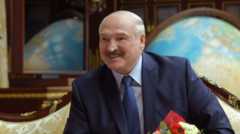

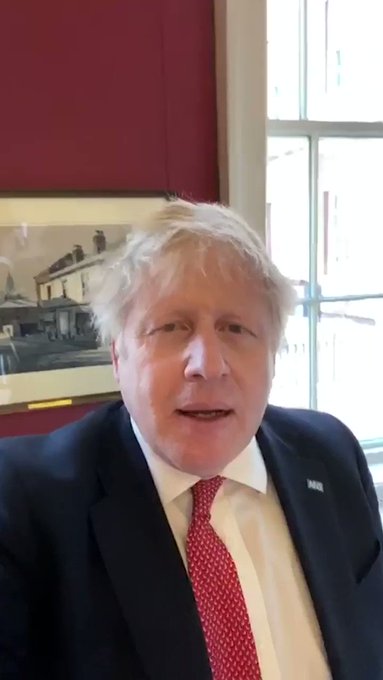

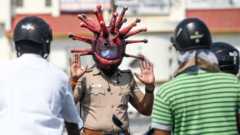
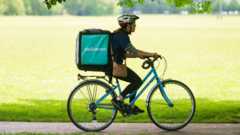

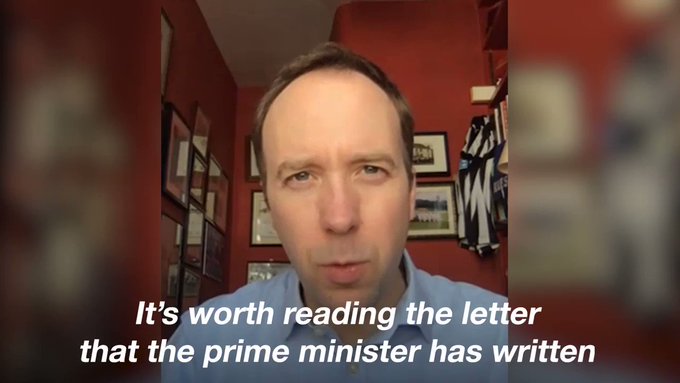

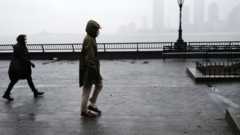


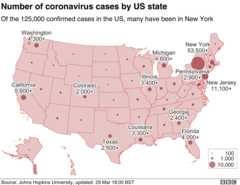
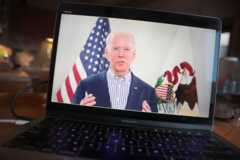
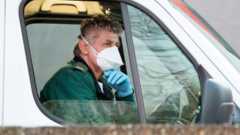
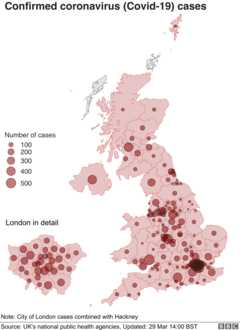
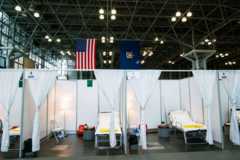
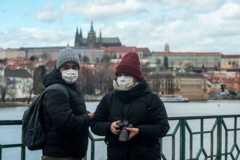
ReplyDeleteThis professional hacker is absolutely reliable and I strongly recommend him for any type of hack you require. I know this because I have hired him severally for various hacks and he has never disappointed me nor any of my friends who have hired him too, he can help you with any of the following hacks:
-Phone hacks (remotely)
-Credit repair
-Bitcoin recovery (any cryptocurrency)
-Make money from home (USA only)
-Social media hacks
-Website hacks
-Erase criminal records (USA & Canada only)
-Grade change
Email: cybergoldenhacker at gmail dot com